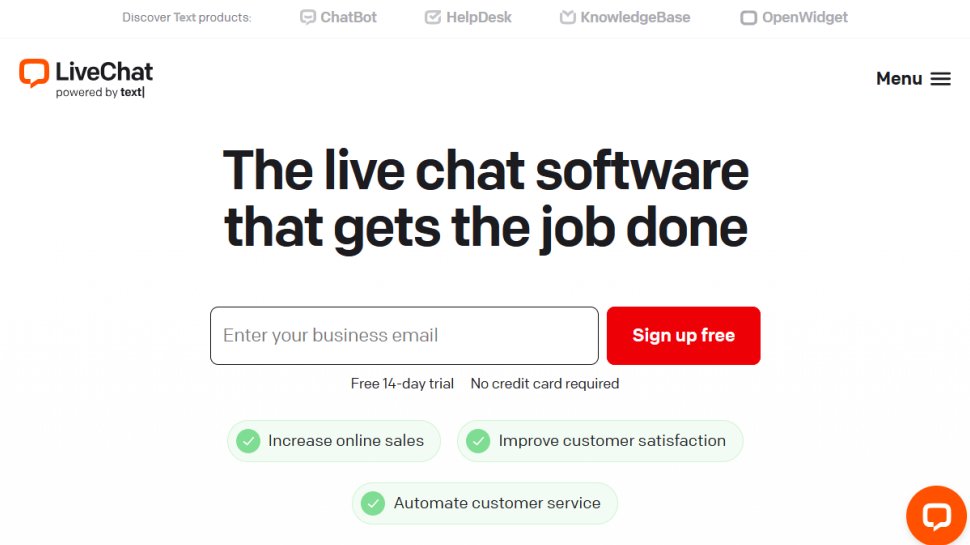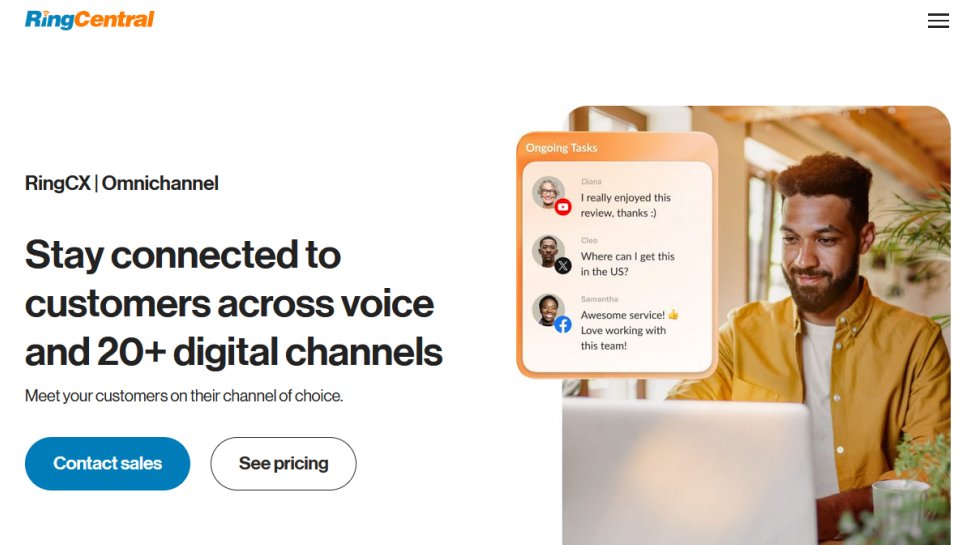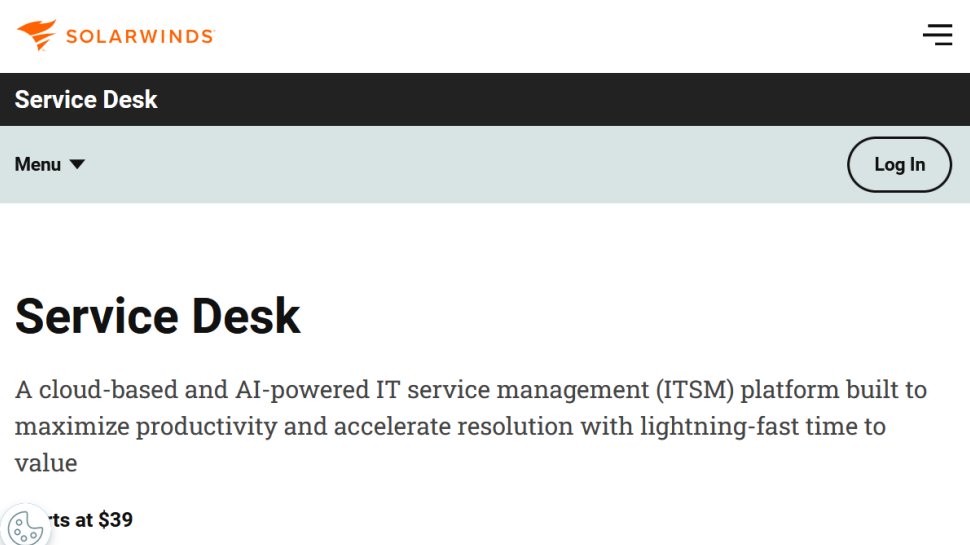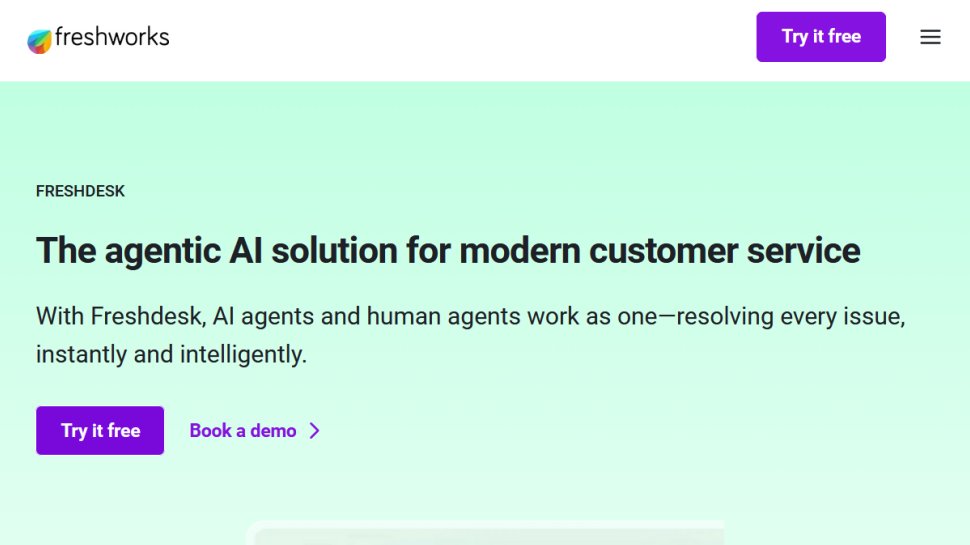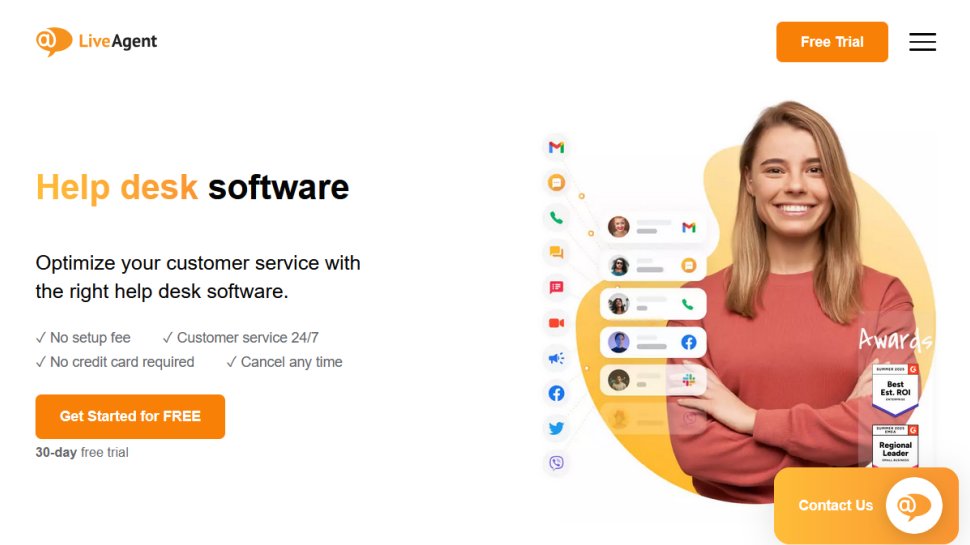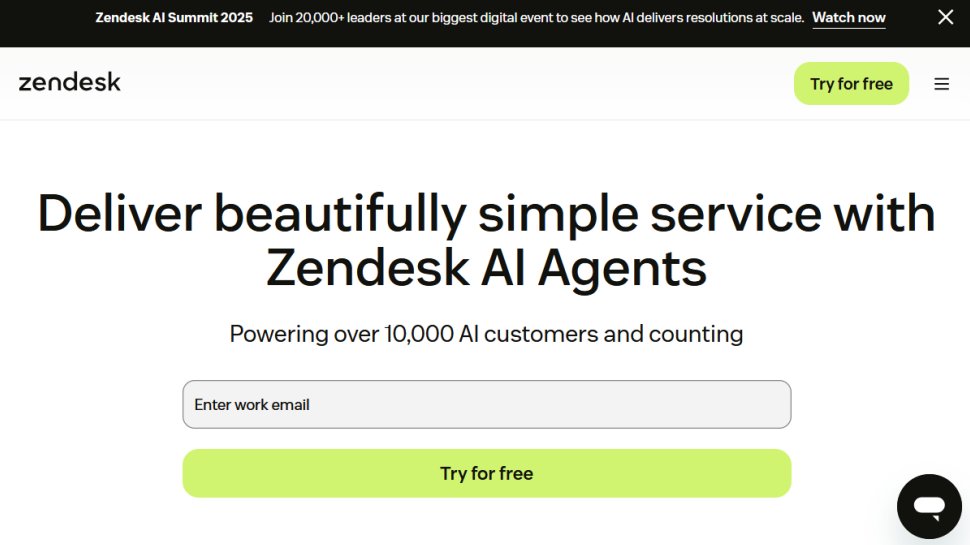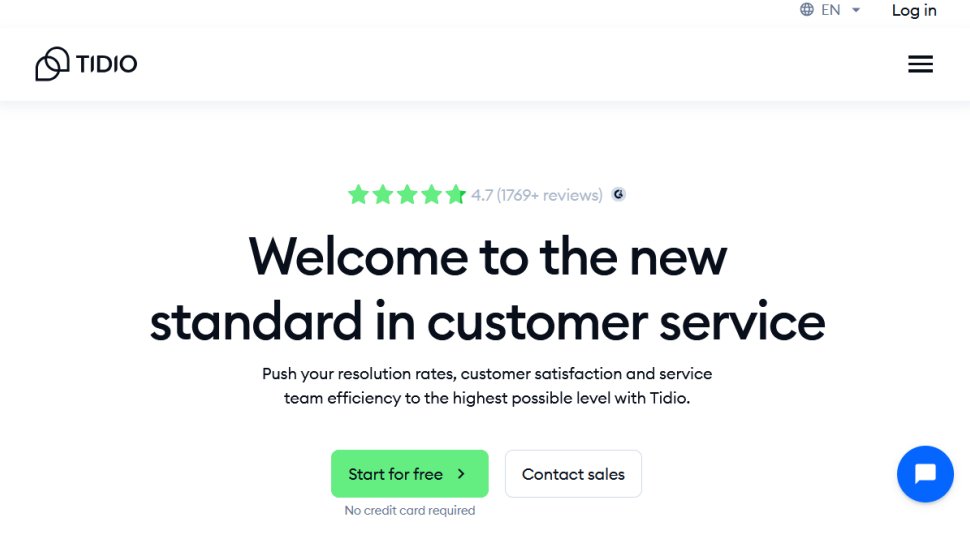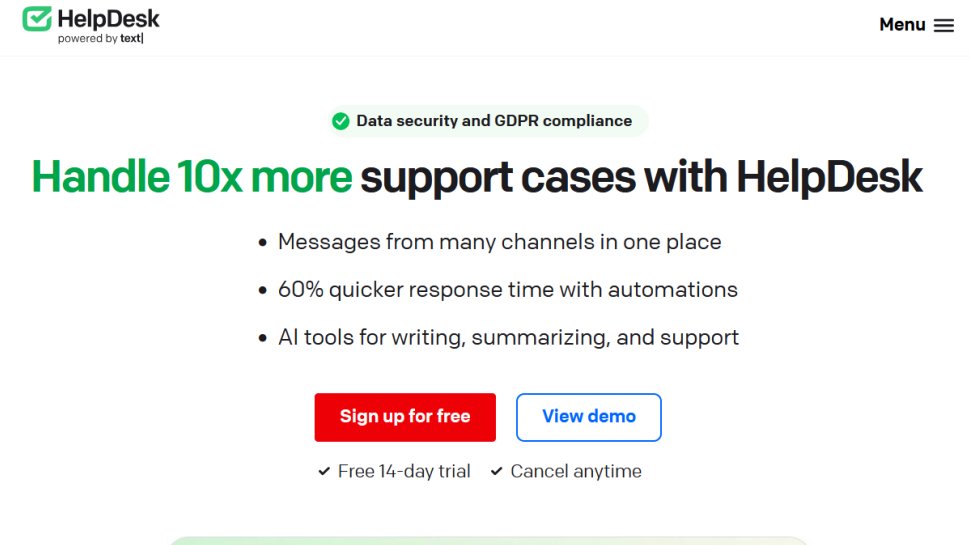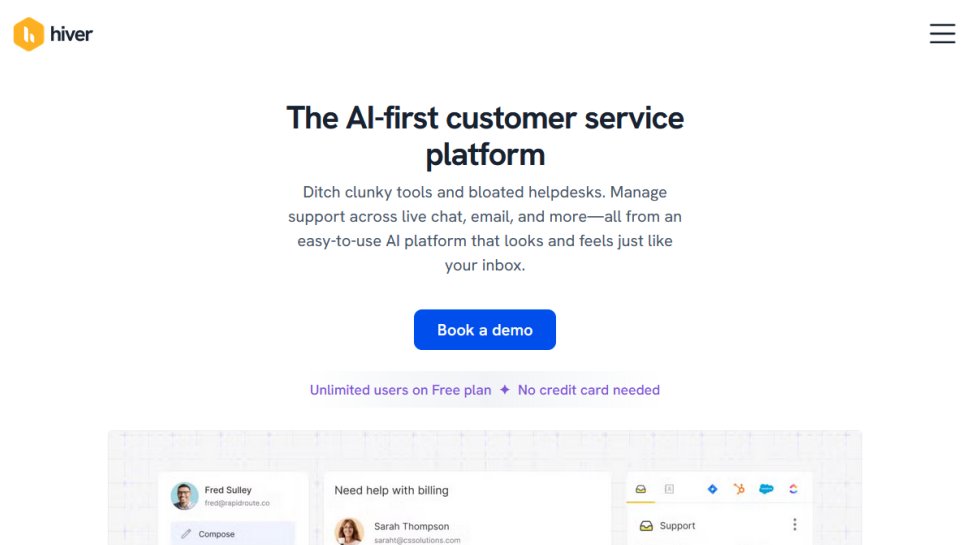Best help desk software of 2025
Helping answer staff and customer queries

Sign up for breaking news, reviews, opinion, top tech deals, and more.
You are now subscribed
Your newsletter sign-up was successful
We list the best help desk software, to make it simple and easy to manage a single platform for answering queries from staff and/or customers.
Whether your support team is working internally or in a customer-facing environment, having good help desk software can make all the difference for your business’ security, compliance, service quality, and support efficiency.
For smaller companies with no dedicated IT department, using a combination of disparate spreadsheets, email threads, and support chatbots may work in a pinch.
But it’s hardly a long-term solution for scaling your business. As support requests continue to pile up and remain unaddressed, you’ll soon have to deal with issues like shadow IT.
But help desk platforms like SolarWinds and RingCentral can help you provide dedicated technical support for both internal teams and paying customers. You’ll be able to track every user journey, along with any relevant support requests and product issues.
Investing in a proper help desk system can save you a lot of time and frustration down the line. But first, you have to understand how to tell good help desk platforms from bad ones.
How can you tell if an IT help desk platform is right for you? We’ve compiled a list of every major help desk tool in 2025, separated by pros, cons, and use cases. If you want options, keep reading.
We've also highlighted the best live chat software.
The best help desk software of 2025 in full:
Why you can trust TechRadar
Best help desk software overall
Reasons to buy
Reasons to avoid
LiveChat is a user-friendly chat platform for quick customer support across many channels. It has strong features to manage communications, generate leads, and sell online. The interface is fully customizable, blending naturally with any website.
The platform connects with over 200 services, including CRM systems, payment services like PayPal and Stripe, and popular messaging apps like WhatsApp, Twitter, and Facebook Messenger. This helps businesses support customers on their preferred channels while managing all communications from one interface.
Features
LiveChat has many features for real-time customer engagement. Its main tools include a live chat interface for quick communication, customizable chat widgets to fit your brand, mobile responsiveness for all devices, and canned responses for common questions. The platform can also start chats based on visitor actions, like time on a page or exit intent.
Advanced tools include AI chatbots that manage repetitive tasks and answer common questions. This allows agents to focus on more complex issues. The system supports file sharing for effective problem-solving, typing previews for quicker replies, and queue management to prioritize urgent requests. LiveChat also groups agents by specialty or department, ensuring customers reach the right team member for help.
Ease of use
LiveChat's interface is user-friendly and requires little technical skill. Features like drag-and-drop file sharing and canned responses are easy to find. This helps agents provide quick and effective support without distractions. The simple design allows businesses with limited tech knowledge to use LiveChat effectively.
Training resources include detailed documentation, video tutorials, and guided setup processes. These tools help new users learn quickly. The dashboard shows ongoing conversations and performance metrics clearly. This makes it easy for managers to track and improve support operations.
Support
LiveChat offers several support channels for users. These include live chat, email, and phone support. Their team is responsive and knowledgeable, helping customers resolve issues quickly.
LiveChat also provides extensive self-service resources. Users can access a knowledge base, video tutorials, and community forums to share ideas and solutions. This layered approach ensures help is always available, no matter the issue's complexity.
Pricing
LiveChat has four pricing plans: Starter, Team, Business, and Enterprise.
The Starter plan costs $20/month per agent if billed annually. If billed monthly, it costs $24/month. This plan includes basic features like chat widgets, customer details, agent ratings, and a ticketing system. The Team plan costs $41/month per agent with annual billing or $49/month with monthly billing. It includes all Starter features plus SMS support, custom customer segments, chat and ticket tagging, file sharing, and advanced analytics.
There are also the Business and Enterprise plans for organizations of larger sizes with more complex needs. All plans come with a 14-day free trial. However, there is no permanent free version available.
Best cloud contact help desk software
Reasons to buy
Reasons to avoid
RingCentral Contact Center is a complete cloud-based solution. It helps organizations deliver great customer experiences with connected and engaged employees. By combining UCaaS and CCaaS, it fits businesses of all sizes. Companies can embrace modern technology, support remote work, cut costs, and exceed customer expectations.
This platform works best for mid-sized to large enterprises in many industries. These include retail, healthcare, financial services, and telecommunications. With its cloud deployment, the solution offers scalability and flexibility to meet changing business needs.
Features
RingCentral Contact Center provides strong omnichannel tools. Businesses can connect with customers through voice, email, chat, and social media. The platform uses skills-based routing to link customers with the right agent. It also has data-driven routing that taps into IVR or CRM data to find the best match for each call.
The solution includes workforce engagement management tools. These help with scheduling, boost agent performance, and analyze speech and text to find customer issues. Advanced features include AI virtual agents, which can handle up to 70% of interactions on their own. There are also performance management dashboards for insights and gamification to enhance agent productivity. The platform integrates deeply with the RingCentral MVP platform for excellent telephony and collaboration.
Ease of use
The RingCentral Contact Center user interface is easy to use. It has a menu on the left side for quick access to functions. The platform works on both desktop and mobile devices. The desktop version has more advanced features, while the mobile apps offer strong tools for managing tasks on the go.
The system is user-friendly. Managers can easily add, change, and move employees between sites as needed. All service staff must be added through the Central web dashboard before they can start working. This centralized approach helps keep user management secure and organized.
Support
RingCentral Contact Center has many support options. Users can access self-help resources or get live assistance. The knowledge base includes tutorials, guides, videos, and full documentation. This allows users to find solutions to common problems on their own.
For more complex issues, RingCentral offers live chat, email, and phone support. There is also a community forum where users can discuss problems and share solutions. This multi-tiered approach makes sure help is available, no matter the issue's complexity or the user's preferred support method.
Pricing
RingCentral Contact Center has three main packages. You can add optional features like speech recognition, customer integrations, and workforce optimization. Pricing isn’t listed on their website, but third-party sources say that solution starts around $65/user/month. Final costs depend on your specific needs and customizations.
For businesses using RingCentral's communication platform, the Core plan costs $30 per user if paid annually. This plan includes basic call features and limited team messaging. The Advanced plan is $35 per user per month annually. The Ultra plan is $45 per user per month annually. For exact pricing on the Contact Center solution, RingCentral’s sales team should be able to provide you a custom quote.
Read our full RingCentral Contact Center review.
Best ITSM help desk software
Reasons to buy
Reasons to avoid
SolarWinds Service Desk is a cloud-based IT service management (ITSM) platform. It helps businesses streamline IT operations and improve service delivery. This platform has many features for both IT professionals and end-users. It suits organizations of various sizes and industries.
The platform combines service desk functions with asset management tools. This allows businesses to handle IT infrastructure and support tasks from one interface. SolarWinds Service Desk is scalable, which makes it adapt well to growing business needs.
Features
SolarWinds Service Desk provides a complete set of tools for incident management, asset tracking, and service delivery. Its ticket management features enable automated routing, prioritization, and notifications. The platform also has a knowledge base, allowing agents to access information quickly while solving issues.
A key feature is its asset management, which helps organizations track and manage hardware and software assets throughout their lifecycle. This includes network discovery, contract management, and license compliance. The service catalog standardizes service requests, while the change management module tracks and approves IT changes.
Advanced features include AI-powered virtual agents to automate routine tasks, customizable dashboards for real-time insights, and integration with over 200 third-party apps. The platform supports ITIL best practices, making it ideal for organizations that want to align IT services with industry standards.
Ease of use
SolarWinds Service Desk is user-friendly, with an intuitive interface that needs little technical skill. It has drag-and-drop features, allowing agents to manage tickets and assets easily.
The platform includes detailed documentation, video tutorials, and guided setups to help new users learn quickly. The dashboard shows clear views of ongoing operations and performance metrics. This helps managers monitor and improve support activities. However, users may face a learning curve due to the many features available.
Support
SolarWinds offers several support options for Service Desk users. You can reach out via email, live chat, or an online ticket submission system. Their support team is quick to respond and knows the product well, helping customers fix issues fast.
SolarWinds also has a wealth of self-service resources. These include a knowledge base, video tutorials, and community forums for users to share ideas and solutions. This layered approach guarantees that help is available, no matter how complex the issue is. However, phone support is not an option. This may disappoint some users who prefer speaking directly for urgent matters.
Pricing
SolarWinds Service Desk has three main pricing plans: Team, Business, and Professional.
The Team plan starts at $39 per technician per month when billed annually. It offers essential features for small to medium-sized businesses. The Business plan costs $79 per technician per month when billed annually. This plan includes advanced features like change management and a service catalog.
The Professional plan requires a custom quote. It includes the most features, such as AI capabilities and advanced automation. All plans include asset management features. Pricing for asset tracking depends on the number of assets and is available upon request.
SolarWinds also offers a free trial for potential customers to explore the platform before making a decision. While the pricing is clear, costs can quickly rise for larger organizations with many technicians and assets to manage.
Read our full SolarWinds Service Desk review.
Best help desk software for ease of use
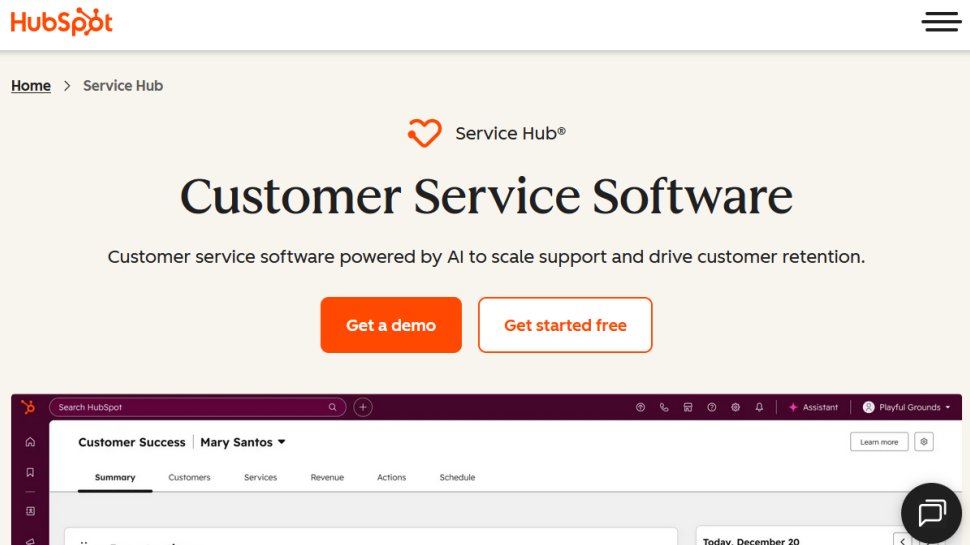
Reasons to buy
Reasons to avoid
If you’re familiar with HubSpot, you likely already know that the company has plenty of services and products in its offering. One of those is HubSpot’s Service Hub, which features both a help desk and a free ticketing software that is fully integrated with a CRM.
This makes HubSpot a good choice for businesses wanting to provide high-quality and efficient customer support.
Features
HubSpot’s help desk has a universal inbox with a single, unified dashboard where all customer queries from every channel (email, web form, chat, social media, phone) are converted into tickets and stored in one place. This is very convenient because it eliminates inbox clutter and makes it much harder to miss any requests.
The tickets themselves are automatically created when a customer submits a form, sends an email to your support address, or starts a chat conversation. Tickets can also be customized (ticket properties, pipelines, and statuses) to help visualize the support process and manage the team's workload more efficiently.
Also, you can automatically assign tickets to the right agent based on expertise, workload, or request type.
Additionally, with HubSpot’s help desk, you can track key support metrics and team performance with pre-built and customizable reports.
Ease of use
HubSpot’s services are generally well-designed and easy to use, and this one is no exception. The layout is clean and intuitive, plus you can also customize the platform to your specific needs. The whole ticket pipeline system is user-friendly, and users likely won’t have any issues figuring things out.
As for onboarding resources, there are a lot of resources available that are especially handy for new users. Additionally, the in-app guidance and tooltips add even more when it comes to assisting users in discovering new features and figuring things out. Also, HubSpot Academy has a full library of free courses, certifications, and guides that teach you how to use every part of the service.
Support
HubSpot offers several support channels. 24/7 support is available, including live chat, phone, or email. Although, do note that depending on your plan, not all types of support will be available. Additionally, the platform has a lot of helpful content on its knowledge base and community forums.
The community forum in particular is very active, and it’s a great place not only to look for help but for helpful tips, best practices, or just general exchange of knowledge. Also, HubSpot Academy can help here as well, with a bunch of courses and lessons available for free.
Pricing
There is a free plan available with a mix of features and tools thrown in. As expected, you are limited with the free plan, such as having only 1 ticket pipeline per account with no automation available.
The Starter plan is priced at $9 per month per seat if you pick the annual option. If you go monthly, the price rises to $15 per month per seat. The Starter plan adds more to everything that was available with the free option, in addition to new features such as simple ticket automation, conversation routing, and email and in-app chat support.
Larger teams or businesses might want a more comprehensive solution, which starts at $90 per month per seat for annual billing, or $100 per month per seat for monthly billing. This plan adds extra features like a customer success workspace, customer portal, or customer feedback surveys.
Read our full HubSpot review.
Best help desk ticketing software
Reasons to buy
Reasons to avoid
Freshdesk is cloud-based software for customer support. It offers tools that improve service operations. Developed by Freshworks, it serves businesses of all sizes, from small startups to large enterprises. The platform has an easy-to-use interface and many features for managing customer interactions across various channels.
Freshdesk aims to simplify support by centralizing customer communications. It automates routine tasks and provides strong tools for collaboration and analytics. Its AI capabilities, powered by Freddy AI, offer intelligent automation and insights to enhance functionality.
Features
Freshdesk has many features that cover all parts of customer support. Its ticketing system is key. It helps businesses turn customer inquiries from email, phone, chat, and social media into trackable tickets. The system can automatically route, prioritize, and escalate tickets to handle customer issues efficiently.
The platform also offers strong self-service options. Customers can use a customizable knowledge base and community forums to find answers on their own. Freshdesk features an AI-powered chatbot named Freddy. Freddy handles routine inquiries, allowing human agents to focus on more complex issues. The software includes team collaboration tools, so agents can work together on tickets and share information easily.
Advanced features include customizable workflows, SLA management, and a full analytics suite for tracking performance metrics. Freshdesk supports omnichannel capabilities, so businesses can give consistent support across different communication channels. Its marketplace has many integrations with popular business tools, boosting its versatility for various business needs.
Ease of use
Freshdesk is known for its easy-to-use interface and design. This makes it simple for both technical and non-technical users. The platform's clean layout and organized features help new users learn quickly. Freshdesk also offers customization options. Businesses can adjust the interface and workflows to fit their needs without needing advanced technical skills.
The platform has great onboarding resources. These include video tutorials, webinars, and a detailed knowledge base. They help users get skilled with the software fast. The drag-and-drop interface for features like automations and report creation makes using the platform even easier. This setup reduces the time needed for configuration.
Support
Freshdesk provides several support channels, including email, phone, and live chat. Their support team is responsive and available 24/7 for any issues or questions. Users can also find a large knowledge base, community forums, and video tutorials for self-help.
The platform offers various support levels based on the selected pricing plan. Higher-tier plans come with priority support and dedicated account managers. This tiered system helps businesses get the support they need within their budget.
Pricing
Freshdesk has a flexible pricing structure with five plans for different business sizes. There’s a free plan with basic help desk management features.
Paid plans start at $15/agent per month for the Growth plan and go all the way up to the Enterprise plan for $79/agent a month and the Forest plan at $109/agent per month.
All paid plans come with a 21-day free trial. This allows businesses to test the platform before committing. The pricing is clear, with no hidden fees. It scales based on the number of agents. This flexibility makes Freshdesk appealing for businesses, from small startups to large enterprises.
Read our full Freshdesk review.
Best help desk software for live support
Reasons to buy
Reasons to avoid
LiveAgent is a powerful help desk software. It combines ticketing, live chat, and call center features into one platform. LiveAgent is versatile, serving businesses from small startups to large enterprises. It offers tools that improve customer support and service quality.
This platform is notable for its wide range of features. It centralizes customer communications from email, social media, and voice. With over 200 integrations, LiveAgent connects easily with popular CRM systems, payment services, and messaging apps. This creates a smooth support ecosystem.
Features
LiveAgent has many features to improve customer support workflows. Its ticketing system includes mass actions for bulk tasks, agent collision detection to avoid multiple agents on one ticket, and audit logs that track support activities. Managers can also use time tracking to assess agent productivity and performance.
Advanced features consist of multiple ticket tabs for handling many inquiries at once, canned responses (macros) for quick answers, and WYSIWYG editors for professional emails. LiveAgent offers strong spam filtering to block unwanted inquiries, search and replace tools to safeguard customer data, and customizable business hours to inform customers about support times. The platform even allows GIF integration for personal touches and has notification sounds to keep agents alert.
Ease of use
LiveAgent's interface is easy to use. It has a 4.6 out of 5 rating from Indian users on Capterra. The design helps support teams adapt quickly without needing much technical knowledge. The dashboard shows clear views of ongoing support tasks and performance metrics. This helps managers monitor and improve their team's work.
Training resources are thorough. Users can find detailed documentation and guides to learn the platform. LiveAgent also offers mobile apps for iOS and Android. These apps allow support agents to handle customer inquiries anywhere, ensuring service continues smoothly.
Support
LiveAgent offers several support channels, including live chat, email, and phone support. Customers have given positive feedback about their support team. Users praise their quick responses and deep product knowledge. Reviews describe the support experience as "flawless" and "spotless," showing high customer satisfaction.
LiveAgent also provides extensive self-service resources. This includes a knowledge base and community forums for users to share ideas and solutions. And their support team is available 24/7, which ensures help is always accessible, no matter the complexity or time.
Pricing
LiveAgent has five pricing tiers for different business sizes and needs. The Free plan includes basic features like ticket history, email ticketing, live chat, and call center support.
The Small plan starts at $15 per agent per month. It adds email support, ticketing, contact forms, a forum, a knowledge base, and mobile apps.
The Medium plan costs $29 per agent per month. It includes live chat, real-time visitor monitoring, chat invitations, and feedback management. And the Large plan is $49 per agent per month. It offers social media integration, call center support, gamification features, and branding-free service.
For a comprehensive solution, the Enterprise plan is $69 per agent per month. It includes extra support and exclusive services for large organizations. All paid plans have annual billing options, which save money compared to monthly billing.
Read our full LiveAgent review.
Best comprehensive help desk software
Reasons to buy
Reasons to avoid
Zendesk is a flexible customer service platform. It helps businesses manage interactions across many channels. The software includes tools for helpdesk, email marketing, live chat, sales, employee engagement, and customer engagement. This makes it a good fit for organizations of all sizes aiming to improve customer experience.
As a cloud-based solution, Zendesk is quick to set up. It usually takes days instead of months to start using. Users appreciate its ease of use, customization options, and many integration choices. This allows businesses to adapt the system to their needs without needing a lot of technical skills.
Features
Zendesk offers powerful features to improve customer support. Its ticketing system is the core, helping businesses collect, organize, and respond to customer inquiries from email, phone, chat, and social media. The platform also supports self-service options like knowledge bases and community forums, allowing customers to find answers on their own. This cuts down on support ticket volume.
Advanced features include Zendesk Explore for analytics and reporting. This provides businesses with key insights into customer experience metrics and support team performance. Zendesk Gather helps build online communities. AI-driven self-service gives instant answers, while automated workflows ensure efficient ticket routing.
The platform also manages Service Level Agreements (SLAs) to prioritize urgent issues. For businesses using IT Service Management (ITSM), Zendesk has specialized features like service request fulfillment, incident management, problem management, service catalogs, and change management, all following ITIL best practices.
Ease of use
Zendesk is also known for its easy interface and fast setup. Implementation usually takes days, not months. The platform is ready to use, so businesses can start without costly developers or deep technical skills. This simplicity also helps agents; most can onboard in just a few hours thanks to the user-friendly design.
Admin needs are low compared to older systems, which often require dedicated teams. Streamlined setup lets businesses quickly meet changing customer demands without using up too many resources. For instance, Stanley Black and Decker set up a complete omnichannel Zendesk solution in three weeks. Their global support teams were operational after just one day of training, showing how accessible and easy Zendesk is to implement.
Support
Zendesk offers several support options for users facing issues or questions. The main channels are a help center, an active user community, and a chatbot called Z Bot. Users can also get direct help through live chat with an agent.
For urgent or simple problems, you can click your profile avatar in any Zendesk product and select "Get help" to reach Z Bot. The bot provides immediate help or connects users with a live agent if necessary.
For more complex or non-urgent issues, you should submit a request via the web form. Do this by signing into the Zendesk Help Center and choosing "Submit a request" from the profile menu. The support team reviews these requests and replies via email. Users can track their requests under "My activities > Requests" in the Help Center.
Pricing
Zendesk has a flexible pricing structure with several plans for different business needs. For its support solution, prices start at $19 per agent per month for the Support Team plan. It includes basic features like customizable sales pipelines, email and calendar integrations, and call tracking.
The Suite Team plan costs $55 per agent per month annually. It adds features such as a product and price book, advanced reports, and sales forecasting. The Suite Professional plan is $115 per agent per month annually and includes lead scoring and task automation.
For larger organizations, Zendesk offers a Suite Enterprise plan with custom pricing. It offers unlimited pipelines and more customization options. Zendesk also has a lower Total Cost of Ownership than legacy systems. This is due to its cloud-based nature, which allows for quick deployment. Organizations can start small and scale up as needed.
Read our full Zendesk Support review.
Best help desk software for chatbots
Reasons to buy
Reasons to avoid
Tidio is a flexible customer support tool that combines live chat, AI chatbots, and helpdesk features. It boosts customer engagement and streamlines support tasks. This platform is user-friendly and accessible for all businesses, especially ecommerce stores and service providers aiming to enhance communication.
As a cloud-based solution, Tidio offers real-time tools for customer engagement. It helps businesses connect with website visitors right away. Its integration features allow it to work smoothly with popular ecommerce platforms like Shopify and content management systems such as WordPress. This makes Tidio a versatile choice for different business needs.
Features
Tidio provides a wide range of features for real-time customer engagement and support automation. Its live chat tool lets businesses talk instantly with website visitors. Features include live typing previews, which show agents what customers are writing before sending. Canned responses allow for quick replies, while the AI Reply Assistant, powered by GPT-4, helps create professional responses on the spot.
The platform's chatbot functions are impressive, offering 21 pre-built templates in 3 areas: lead generation, boosting online sales, and enhancing communication. These chatbots are easy to customize, requiring no coding skills. They can handle common inquiries, welcome visitors, and gather contact details.
Tidio also has a multichannel shared inbox, which centralizes communications from live chat, email, Instagram, WhatsApp, and Facebook Messenger. This helps support teams manage all customer interactions from one dashboard.
Ease of use
Tidio is known for its easy-to-use interface and design. It’s perfect for users with little technical skill. You can quickly install and set it up on your website by copying and pasting simple codes. The chat widget can be fully customized to fit any website's style. This also applies to the chatbots, allowing users to make automated workflows without needing coding skills.
You can access Tidio on both web and mobile apps. It works on Android and iOS devices, as well as Mac and Windows computers. This makes it easy for support teams to manage customer communications from anywhere. However, some users have noticed slow response times at times, which can affect the experience.
Support
Tidio offers a range of support resources for users. This includes documentation, tutorials, and several direct assistance channels. Email chat is available 24 hours, but you can also request for a human agent to assist you when speaking with the chatbot in their support hub.
There's also a dedicated Help Center and Youtube channel, which offer many useful self-help resources for troubleshooting and learning. Sadly, Tidio does not offer phone support, since most issues require file and screen sharing to thoroughly resolve.
Pricing
Tidio has flexible pricing with various plans for different business needs. The Free Forever plan offers 50 live chat/ticket conversations, 50 Lyro AI conversations, 100 chatbot-reached visitors, and 500 emails per month. This plan is great for new businesses starting customer service.
For businesses ready to grow, the Customer Service plans begin at $29 per month for the Starter tier. This includes 100 live chat/ticket conversations, basic analytics, a live visitors list, operating hours settings, and live chat support. The Growth plan starts at $59 per month, offering 2,000 conversations (which can scale up), advanced analytics, power features, no Tidio branding, and permissions management.
Tidio also has specialized plans for unique needs. The Lyro AI Chatbot plan starts at $39 per month to help automate up to 70% of customer inquiries. The Flows plan starts at $29 per month for advanced sales and support automation. The Email Marketing plan starts at $10 per month for lead generation through email automation. All paid plans include a 7-day free trial, no credit card needed.
Read our full Tidio review.
Best help desk software for automation
Reasons to buy
Reasons to avoid
HelpDesk is a simple customer support platform. It helps businesses manage and respond to inquiries with a ticketing system. The software has a clean, easy-to-use interface. This makes it simple for support teams to organize, prioritize, and track customer requests from start to finish. You won't feel overwhelmed by any extra complexity.
The platform delivers core help desk features reliably. It’s perfect for small to medium-sized businesses lookign for a straightforward solution, free of the clutter of enterprise systems. HelpDesk focuses on ease of use while offering all the essential tools for effective customer support management.
Features
HelpDesk has a strong focus on efficient ticket management. Users can submit support requests through different channels like email, web forms, and social media. These requests turn into trackable tickets automatically. The system sorts tickets and prioritizes them based on urgency or impact. It assigns them to team members based on set rules. That way each inquiry gets the right attention.
The platform features a clear workflow for handling tickets. It tracks status updates and agent actions during the resolution process. Key functions include ticket assignment, tracking, prioritization, and team collaboration tools. These help agents work together on complex issues. HelpDesk also has communication tools that let agents ask users for more information and provide updates. This keeps communication clear throughout the support process.
Ease of use
HelpDesk is built on simplicity and user-friendliness. It's easy for teams with different technical skills to use. The clean interface helps new agents learn quickly and start working without much training. The platform focuses on key functions, so users aren't overwhelmed by unnecessary features.
The system offers support 24/7/365, ensuring help is always available. This shows the company’s commitment to user success. It also highlights their understanding of how crucial reliable assistance is for support teams that help others.
Support
HelpDesk provides 24/7 support, available all year long. This means help is always there, no matter the time or day. Businesses can rely on this service for their customer support needs.
The company calls its support team "support heroes," to indicate the pride they take in providing good support. You can contact their agents anytime for help with the platform. You can get assistance with using the software, solving problems, or improving their support processes, helping them get the most out of the software.
Pricing
HelpDesk has a clear pricing structure that adjusts to business needs. However, specific prices aren’t listed in the search results. But the platform uses tiered pricing based on features, agent count, and support volume. This makes it suitable for businesses of all sizes.
The company focuses on delivering value through essential features. This means they avoid charging for extras, offering a cost-effective solution compared to more complex enterprise options. To get the latest pricing details tailored to unique needs and team size, businesses should reach out to their sales team.
Read our full HelpDesk review.
Best help desk software for Gmail
Reasons to buy
Reasons to avoid
Hiver is a customer support platform that turns Gmail into a strong help desk solution. It integrates directly with Gmail, letting teams handle customer inquiries within their email interface.
This makes Hiver a great choice for businesses using Google Workspace. They can transition smoothly from regular email chains to a more powerful support system.
Features
Hiver offers a complete set of features to improve customer support. Its main function is shared inboxes, which let teams work together on customer inquiries right in Gmail. Agents can assign emails, track their status, and add internal notes without leaving the platform.
Hiver also has advanced features like AI tools for email summarization, template suggestions, and automatic closure of conversations that don’t need manual input. It includes strong automations to manage routine tasks, allowing agents to focus on tougher issues.
The platform supports multiple communication channels, such as email, live chat, voice, and WhatsApp, all from one interface. Plus, Hiver has a knowledge base feature that helps businesses create self-service options for customers.
Ease of use
Hiver is known for its easy-to-use interface and quick learning curve. It works within the familiar Gmail environment, so support teams can adapt fast without much training. The platform also has mobile apps for Android and iOS, letting agents manage customer communications anywhere.
Even with its simplicity, Hiver still offers powerful features. It includes workload distribution, collision alerts, and integrations with popular tools like Asana, Slack, and Salesforce. These features boost team productivity and collaboration.
Support
Hiver offers 24/7 customer support across all its pricing plans, ensuring that users can get assistance whenever needed. Support channels include chat and email, with additional resources such as a knowledge base and video tutorials available for self-help options.
The company emphasizes its commitment to customer success, with higher-tier plans including a dedicated success manager to help businesses maximize the value of the platform.
Pricing
Hiver offers a tiered pricing structure with three paid plans and a free plan designed to accommodate businesses of different sizes and needs. The paid plans start from $19/agent each month and go up to $59/agent a month.
All paid plans are billed annually and come with a 7-day free trial. The Pro plan includes features like live chat auto-assignments, basic workflow automations, and analytics, while the Elite plan adds advanced features such as skill-based assignments, advanced automations, and HIPAA compliance.
It's worth noting that Hiver does not offer a permanent free plan beyond the trial period, which may be a consideration for businesses looking for long-term free options.
Read our full Hiver review.
Other help desk software to consider
- Zoho Desk is the cloud-based, help desk software offering that focuses on being context aware. It includes features such as prioritization of higher importance or overdue tickets, dashboards to track quality metrics, and the support to create a Knowledge Base for simpler issues that can be self-serviced. Zoho Desk can be used by agents with mobile apps for iOS and Android.
- Kayako is a help desk software offering that focuses on ease to use, and fosters a personal conversation with the customer. Standout features include support for the creation of multiple help centers each with their own content (termed Multibrand), live chat support, canned responses for common questions, support for SLA’s, and the ability to automate the workflow with smart business rules.
- Agiloft is another help desk option that aims to streamline operations and efficiency, and make actionable insights more easily available. It's a very scalable solution but also offers some very good pricing options. Agiloft have been a market leader since the 1990's, and the latest offering is slick and easy to both understand and use.
- Bitrix24 is a powerful platform that includes a contact center as well as features for staff communications, project management, and CRM. The contact center aspect allows for a wide range of communications channels to be covered, not least live chat, social media messages, as well as SMS, email, and even phone calls. There's a free tier for up to 12 users.
- Happyfox Help Desk is a powerful and easy to use system that isn’t as competitively priced as it once was. But whatever is asked for this software, it might well be worth it for the high level of customization and integration on offer. Happyfox users are generally very pleased with this solution due to the effectiveness of the ticket handling solution and the solidity of the platform.
We've listed the best Contact Center as a Service (CCaaS) platforms.
Help desk software FAQs
What is help desk software?
Help desk software is a platform that helps manage customer and employee support. It acts as a hub for handling inquiries and support requests from different channels. These requests turn into trackable tickets that can be managed throughout their lifecycle. This type of software allows businesses to accept, track, and respond to support requests in an organized way, improving upon email-based support systems.
Help desk software follows a clear workflow. When a customer submits a query via email, web forms, chat, or social media, the software turns it into a ticket with a unique ID. These tickets are assigned, prioritized, and sent to the right team members using set rules. The system helps support staff work together, keeps all communications in one place, and provides tools for resolving issues.
Help desk software benefits organizations of all sizes, from startups to Fortune 100 companies. It started in IT departments for technical support, but now it’s used in customer service, HR, and internal support teams. As businesses grow and support needs rise, help desk software is vital for maintaining quality service. It helps when email inboxes get crowded, and support agents can’t keep up with incoming requests.
When to invest in help desk software?
Criteria | Buy help desk software if | Don't buy help desk software if |
|---|---|---|
Support Volume | Your support email inboxes are overflowing and requests are being missed | Your business handles very few support requests that can be managed through email |
Team Efficiency | Your support agents are struggling with productivity due to disorganization | Your team consists of only 1-2 people handling occasional support requests |
Performance Tracking | You need to track performance metrics like response times and customer satisfaction | Your support processes are extremely simple and don't require tracking |
Self-Service | You want to provide self-service options through knowledge bases and FAQs | Your budget is extremely limited and basic email support is sufficient |
Issue Prioritization | You need to prioritize and escalate important customer issues | You don't need to collaborate across multiple support team members |
Business Growth | Your business is growing and support request volume is increasing | You don't need reporting or analytics for your support operations |
Process Automation | You want to automate routine support tasks to improve efficiency | Your business doesn't require consistent support processes or documentation |
Communication Channels | You need to support customers across multiple communication channels | You don't need to enforce service level agreements or response time standards |
Team Collaboration | You want to improve team collaboration on complex support issues | Your support processes are extremely simple and don't require tracking |
Which help desk software is best for you?
When deciding which help desk software to use, first consider what actual needs you have. For example, someone simply wanting to communicate with a handful of people on a casual basis may find a a free options such as email or social media cheaper is the more cost-effective. However, for professional or business purposes, especially with a large number of people and on a regular basis, then you will probably want to look to the higher-end help desk software options to properly cater for your needs, while also providing for all of the more advanced tools that are included.
What is help desk software used for?
Help desk software may be primarily used to resolve customer queries, but it is valuable for more than that. Today, many help desk solutions are about more than troubleshooting. They can add genuine value.
The data collection and analytics capabilities of help desk platforms mean they can tell companies a great deal about their customers. From this information they can adjust their marketing and sales strategies accordingly and hopefully boost conversion levels
What are the benefits of help desk solutions?
Help desk solutions can add context to your support services. Rather than providing a generic response to a customer issue, these tools can aid the personalization of your support. They help you meet customers on their own terms via the channel that they prefer.
They help add structure to your customer support by providing a dashboard where you can queue and organize requests. This not only helps with the delivery of better customer service but empowers individuals too. They feel valued by a business, enhancing customer loyalty.
What types of companies need help desk software?
Put simply, any company that deals directly with customers could benefit from a help desk solution. Have you heard from customers saying they are finding it challenging to contact you? Or get a particular issue resolved? If so, it might be time to look at a help desk solution (or if you already have one, seek a new one.
Ecommerce firms, payment providers, IT providers, event venues, and many other companies are just some of the businesses that engage with customers regularly. Good customer support can act as a massive competitive advantage, so any business that wants to improve its standing with customers may want to explore the potential advantages of using a help desk.
What are some of the main features to look out for?
Email support is one of the core features of a help desk solution, with emails automatically converted into tickets so agent workflow can be organized appropriately. A self-service portal can similarly help with support. Community forums and knowledge bases are also frequently included.
Automation features are also common and can help reduce support costs and free up resources within your support team. Meanwhile, reporting and analytics functionalities can help with measuring various metrics, including agent productivity, customer satisfaction, and cost.
Best practices for implementing help desk software
First of all, if you’re thinking of launching a help desk, research your support needs and explore your options. Then when you’ve got a short list, see if any of them offer a demo or free trial. Either of these will allow you to get to grips with help desk solution before you commit yourself financially.
Explore your chosen help desk’s support offering, such as how-to guides, community forums, and knowledge bases. Training might not be necessary, but that all depends on how intuitive your help desk is to use. And even if you decide against training your support team in using your new tool, still try to foster a culture of helping and hire employees that fit within it.
How we tested the best help desk software
To test for the best help desk software we searched for a range of popular options as well as took recommendations from people we know who use help desk software regularly. We then tried each platform to see how user-friendly each was, as well as determine what range of tools and advanced options were available. Pricing also came into account when determining our best list.
Read how we test, rate, and review products on TechRadar.
We've also featured the best business phone systems.
Get in touch
- Want to find out about commercial or marketing opportunities? Click here
- Out of date info, errors, complaints or broken links? Give us a nudge
- Got a suggestion for a product or service provider? Message us directly
- You've reached the end of the page. Jump back up to the top ^
Sign up to the TechRadar Pro newsletter to get all the top news, opinion, features and guidance your business needs to succeed!

Ritoban Mukherjee is a tech and innovations journalist from West Bengal, India. These days, most of his work revolves around B2B software, such as AI website builders, VoIP platforms, and CRMs, among other things. He has also been published on Tom's Guide, Creative Bloq, IT Pro, Gizmodo, Quartz, and Mental Floss.
